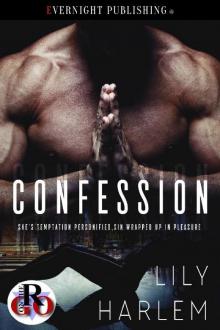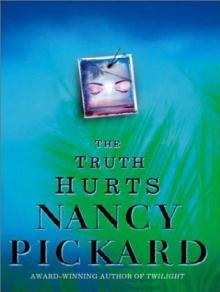- Home
- Nancy Pickard
The Virgin of Small Plains Page 28
The Virgin of Small Plains Read online
Page 28
“I don’t know anything,” Patrick Shellenberger told him. “I’ve just heard the rumors over the years. All I know is that somebody killed her and nobody has known who she is and there was some suspicion at the time because the judge’s son left town all of a sudden right after they found her body.”
“Did you put her name up there?” Marty asked, suddenly suspicious.
“Me? I was just here visiting my grandparents’ graves.”
“Then who put it up there?”
“Maybe your sister did it.”
“Huh?”
“I told you. They say she works miracles.”
Patrick walked away, leaving Marty standing in the cemetery holding the clue to the identity of the young woman in the grave. Now all Patrick had to do was stay out of town so that Marty couldn’t spot him as the one who had talked to him in the cemetery. All he had to do was lie low, stay out at the ranch, and just wait for Sarah’s greedy brother to do the rest of the work.
If Mitch Newquist wasn’t long gone from Small Plains within twenty-four hours, Patrick would eat his hat.
Marty forgot about the miracles as soon as the stranger walked away from him. His attention was focused on the paper in his hand. He fumbled for a pen in his shirt pocket and wrote down the other name he’d heard, using the top of his car as a table. Mitch Neukwist.
The judge’s son.
Judges were rich, everybody knew that.
The hell with taking Sarah’s story to a million different people. It wasn’t like he remembered anything about her anyway. In a moment of clarity Marty had a brilliant thought: To make some money, he only needed to talk to one person.
Chapter Thirty-eight
“Sheriff? You’ve got a call.”
“I’ll take it in my office,” Rex told the deputy.
“Shellenberger,” he barked into the phone, feeling out of sorts. He needed to talk to Patrick, but he hadn’t been able to find his brother either last night or this morning. Nor had he located Sarah’s brother, Marty Francis, now that Marty was out of jail. At least Patrick hadn’t spent the night at Abby’s house, Rex had learned when he had called her to ask if his brother was there. In fact, she hadn’t sounded all that pleased with his brother, so at least that was good news.
“Good morning, Sheriff,” a young male voice said on the other end of the phone connection. “This is Bernie Simmons. I’m a reporter with The Wichita Herald.”
“All right,” Rex said cautiously. It was rare for a journalist to call.
“I guess you had quite a storm up there?”
“That we did. Nobody hurt, though. Some property damage.”
“Well, that’s good. I mean…”
“I know what you mean.”
“I’m calling about something else.”
“And that would be?”
“That unidentified murdered girl they call the Virgin.”
Indigestion rose in Rex’s esophagus again. “You read the tabloids?”
The reporter laughed. “When the story’s about miracles in Kansas, we do.”
“Not much I can tell you. I wasn’t the sheriff then.”
“Who was?”
Rex silently cursed himself for having begged the obvious question. “That would have been my father.”
“No kidding. That’s interesting, a father-son sheriff’s department. Maybe I’ll do a story on how that happened—”
“It happened,” Rex said dryly, “because he won elections and so do I.”
“I wasn’t suggesting nepotism, Sheriff.”
“No? Most people do, until they hear it’s an elected position.”
“Let’s get back to the girl in the grave.”
Rex realized, too late, that he would have preferred to discuss nepotism. “What can I tell you?”
“Now that there’s been this publicity, will you reopen her case?”
“Cases like that are never really closed,” Rex said, stepping carefully.
“Too bad this isn’t California,” the young reporter said.
“That’s probably true in many ways,” Rex allowed, “but why in this case?”
“Because California has that law that requires coroners to submit DNA samples of all unidentified bodies. So they can run them past samples submitted by the families of missing people.”
“Yeah?” Rex said.
“Too bad we don’t have that law.”
“Yeah, but even California didn’t have that back when she was killed.”
“Can’t you still get her DNA and run it through the federal clearinghouse?”
“Maybe, if our county had the money.”
“I’ll bet people would contribute to a fund like that. Our paper could set one up. I could put it in the article I’m writing about her—”
Rex had a sudden vision of worlds colliding, of previously stable systems spinning out of control, of messes he wasn’t going to be able to clean up. “Can I call you back, Mr. Simmons? I’ve got a deputy standing in my door”—Rex eyed his empty doorway—“needing my attention. What you should do is e-mail your questions to me.” Without giving the reporter a chance to object, Rex reeled off his e-mail address at the sheriff’s department, just happening to get one letter of it wrong.
By the time he hung up he was sweating.
But that was only the first of several calls he received that morning, some from other journalists, some from citizens wanting to give tips about the crime. Midway through one of them, Rex started making hash marks on a pad of paper, one mark for every lie he told. By the time he left for lunch at the Wagon Wheel, he had a little row of straight black lines with diagonal slashes through them.
Rex stood up, tore the paper off the pad.
Feeling disgusted with himself, he wadded it up and threw it in the trash.
He didn’t realize there was a storm of a different kind chasing him.
Abby, still on her tear of furious emotion, reached the sheriff’s department after Rex had left for lunch, they told her.
“Where’d he go?”
“Wagon Wheel.”
So she went there, pushing her way through the front door, then winding through the little crowd of people who stood waiting for lunch tables, giving quick tense nods to those who said her name, avoiding eye contact and conversation, pulling away from hands that clutched her arm in an attempt to get her to stop and talk, keeping intent on her purpose, so that when she spied Rex eating at a table in the back with four other men from Small Plains, she charged forward as if they were the only two people in the room.
“Hi, Abby,” Rex said, being the first to see her. “Want to join us?”
“I need you to come with me,” she told him, over the heads of the other men.
Immediately he was alert, and getting to his feet. “What’s the problem?”
“You,” she said fiercely, while his lunch companions stared up at her, their forks and knives halted in mid-bite or slice. “You’re the problem! And me. And everybody else.”
Abby turned on her heels and fought her way back out of the café the same way she’d come, leaving in her trail a hurrying sheriff and a lot of people who wondered what kind of burr the younger Reynolds girl had got under her saddle today.
“We’re taking your car,” she informed him when he finally reached her side.
Knowing better than to argue, Rex said, “Where are we going?”
“To the cemetery.”
“Look at them!” Abby said, pointing at a handful of strangers at the Virgin’s grave.
“Okay,” Rex said. He had pulled onto a shoulder of the highway next to the cemetery and parked there at Abby’s command. It was a beautiful day without a cloud to suggest there could ever be any other sort of weather. He looked where she was pointing and saw cars parked along the cemetery road and he also saw that there were more people standing around one particular grave than any other. “I’m looking. What am I supposed to be seeing?”
“People being taken advantage
of!”
“Who’s doing the taking?”
“We are! This town is, by letting sick people believe those stupid stories, by letting them come here and make things worse for themselves!”
“There’s no law against people believing everything they read, Abby.”
“There are laws against defrauding people!”
“Who’s doing the defrauding?”
“You’ve got to go up there and tell them to go home.”
“Or what? I’m going to arrest them and throw them in jail for wanting a miracle?”
Abby turned to him. “You think this is all right, what’s happening?”
“I think it’s going to blow over pretty fast, Abby, without anybody having to do anything about it. And anyway, most of this county has believed in the Virgin for a long time. I didn’t hear you raising a fuss about it before now. This is just a few more people, and they don’t happen to live here. So what’s the big difference? Why are you so upset about this? I left a pretty good chicken-fried steak and mashed potatoes, you know.”
He tried to get her to smile, but it didn’t work.
It not only didn’t work, but it seemed to provoke her to come at him from another, even angrier angle. “If you or your father had ever solved her murder, if either of you ever so much as found out who she is, this wouldn’t even be happening. She’d just be another poor murder victim in another grave, she wouldn’t be some mysterious saint who can supposedly cure things and work miracles—”
“So you’re saying those people up there, that’s my fault?”
Rex did not like the direction their argument was taking.
“Well, what have you ever done to find out who she is?” Abby yelled at him in the small space of the interior of his SUV. “You won’t send out her DNA, you won’t let anybody else pay for it, you don’t want your deputies to do any investigating, so yeah, maybe it is your fault, wouldn’t you say so?”
“What is wrong with you?” Rex yelled back at her.
Abby burst into tears.
“I’m sorry. I’m sorry,” she sobbed.
Furious and defensive, and not at all swayed by the water show, Rex sat and glared across the seat at her, waiting for a better answer. But when it came, he wasn’t prepared for it.
“I slept with him,” Abby mumbled through her tears.
“With who? With my brother? I already knew that, and that just makes you a bigger fool than those people up there at the grave, and so what?”
“With Mitch. The night of the tornado. He came over. I slept with him, Rex.”
Abby flung herself over the seat and up against Rex’s chest.
“That son of a bitch!” he said, putting his arms around her. “That son of a bitch!”
He held her while she sobbed, which didn’t keep him from also muttering, “Expecting some kind of miracle, were you?” And then he said, when she was finally quiet enough to hear him, “Abby, I did send out her DNA.”
“What?” She pulled herself away so she could look at him.
Rex nodded. “On my own, with my own money, a long time ago. But I already knew who she was. Abby, I’ve always known who she was. I also think I know why she got killed. And I’m pretty sure I know who killed her. And since I’ve never been able to figure out what to do about any of it, and I’ve never talked to anybody else about it, maybe I ought to tell you, and then we can figure something out together.”
He refused to tell her anything more until they got into his office.
Rex barked at his deputies to leave them alone, and then he closed his door and pushed the lock on it. While Abby took a chair on the other side of his desk he went around it and sat down. He reached toward the lower drawer that held the box with the red scrunchie in it and pulled it out, but he also pulled out what was below it: four thin folders. He opened the box first, took out the elastic red hair accessory, and placed it on his desk close to where Abby sat. “This belonged to her,” he said. “She wore this.” Then he picked up the top folder, opened it, and pushed its contents toward her, too. “Here’s the DNA lab report on some hairs that were in it.” He hadn’t given the lab all of them. Even now, there were a few stray dark hairs in it, as if the beautiful girl who had worn it had only just taken it off.
Abby sat with her hands in her lap, not touching anything.
“Her name is Sarah Francis,” Rex said, and waited to see if Abby reacted. When she didn’t, he said, “You might remember her if I tell you she used to clean houses in town. She worked for Nadine for a while.”
Abby frowned, and he could tell she still didn’t quite recall.
“She was beautiful,” Rex said. “A little older than us, long dark hair, really pretty. She lived over in Franklin.”
Finally he saw recognition…and then horror…in Abby’s blue eyes. Her hands flew to her mouth as she gasped, “Oh my God! Oh, Rex. I do remember her. I liked her. She was nice. And she was…gorgeous.” Abby’s eyes, which had only recently stopped leaking tears, filled up again. “That’s her, in the grave, that’s her?”
He nodded. “It’s Sarah.”
“And you’ve known this ever since you got the DNA report…” Abby leaned forward to look for a date on the papers in the folder. “…five years ago?”
“No,” Rex told her. “I’ve known it since the night she died.”
“What? You’ve known since then?”
He nodded. “I’m not the only one. My dad has known it, and my mom, and Patrick. I think your father has always known it, too.”
“My dad? My father knows who she is?”
Rex thought Abby looked as if she couldn’t absorb any additional shocking revelations, but he had many more to give her. For the next half hour, he told her the same story he had told his mother on the night that he, his brother, and father had found Sarah.
Abby didn’t say a word through his telling of it until toward the end, when she said, “Wait a minute. She was supposed to be so beaten up that nobody could identify her. Wasn’t that true?”
“She wasn’t beaten,” he said. “I think my dad and your dad just made that up.”
“But why, Rex? Why would they do that?”
“To protect somebody,” he said, and then held up a hand to stop her obvious next question. “Wait. Please, Abby. Let me finish telling this my way.”
When he did finish—without telling her who he thought the fathers were protecting—Abby stared at him accusingly and said, “You’ve all known, all this time you’ve known, and nobody said anything? Rex, why haven’t any of you identified her? Why have you let people think that nobody knows her name?”
“Like I said, they were trying to protect somebody.”
“Who?”
“My brother,” Rex said, and watched Abby’s hands go to her mouth in horror again. “I’m pretty sure Patrick killed Sarah, Abby.”
“Why? Oh, my God, why?”
Her old friend put a hand flat on each of the other three file folders.
“Because of these,” he said.
Abby started to reach for the folders, but he pulled them back out of her grasp. Then he spread them out in a line, one, two, three, and commenced to open them one at a time. “These are the results of other DNA tests, Abby. Do you remember that I told you that my father said she had been raped?”
Wide-eyed, out of words, Abby nodded.
“She wasn’t raped. She had blood down her legs because she had given birth.”
“How do you know that?” Abby whispered.
“Because I knew she was pregnant and when I saw her in the snow that night, I could see she wasn’t pregnant anymore. Abby, we had just been out in the fields delivering newborn calves. I knew a recently delivered female when I saw one, even if she was human instead of some other kind of mammal, and even if I was only a kid. Sarah had been pregnant, and she’d had the baby, and then she died.”
“What happened to the baby…and who was the father?”
Abby was still whispering, as
if she was afraid to ask such questions.
Rex tapped the first folder. “This is the child’s DNA. I had it identified by comparing it with her DNA.” He looked at her. “It’s Jeff, Abby. Jeff Newquist is Sarah’s child. I got a sample of his saliva off a cigarette he smoked, and I did that because of what I knew. I knew Sarah was pregnant, I knew she stayed at the Newquists’ ranch house during her pregnancy, and then they showed up with a brand new adopted baby. I thought there was at least a chance that baby was hers.” Once he saw that she had absorbed that information as well as she could at the moment, he continued. “My next job was to identify the father, so I sent in samples from the most likely suspects.” He tapped the second folder. “These are Patrick’s DNA results.” He tapped the next one. “Mitch’s.”
“Mitch?” The single word was an anguished protest that gave away her feelings then and now.
“I had his tested because Sarah had a crush on him.”
“But that didn’t mean that he—”
“I thought I should make sure.”
“But how did you do that, how did you even get his DNA?”
“That part was easy. We shared a lot of clothes. I’d wear one of his practice shirts for football, he’d slip on one of my basketball shirts.” Rex smiled slightly. “My mom keeps everything. And a teenage boy’s sweat is a long-lived thing.”
Abby stared at the folders and then up at Rex.
“Does one of them match?” she said, looking afraid.
He nodded again. “Jeff has DNA that matches Sarah’s and Mitch’s, Abby.”
Tears flooded her eyes and she looked down.
He waited sympathetically for her to be able to look at him again. When she did, he said, “I think that’s why his parents sent him away, so they could adopt Jeffrey as if he was a stranger’s baby, and no one would ever connect him to Mitch.” He gave her a little more time to absorb that, and then he said, “I think my brother killed her, out of jealousy.”
He expected her to look horrified again, but this time, she didn’t.

 The Scent of Rain and Lightning
The Scent of Rain and Lightning No Body
No Body The Secret Ingredient Murders: A Eugenia Potter Mystery
The Secret Ingredient Murders: A Eugenia Potter Mystery The 27-Ingredient Chili Con Carne Murders: A Eugenia Potter Mystery
The 27-Ingredient Chili Con Carne Murders: A Eugenia Potter Mystery Twilight
Twilight Marriage Is Murder
Marriage Is Murder I.O.U
I.O.U The Virgin of Small Plains
The Virgin of Small Plains Generous Death
Generous Death The Whole Truth
The Whole Truth The Blue Corn Murders
The Blue Corn Murders Say No to Murder
Say No to Murder Confession
Confession Dead Crazy
Dead Crazy The Truth Hurts
The Truth Hurts Bum Steer
Bum Steer